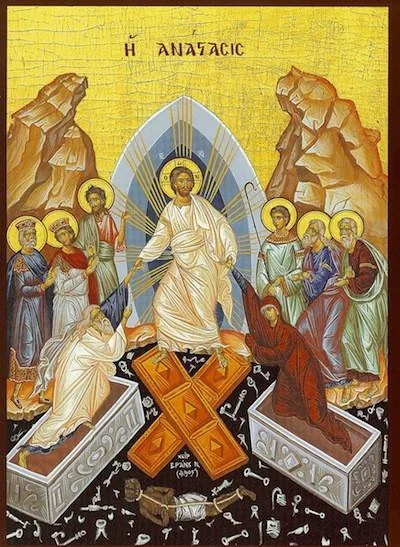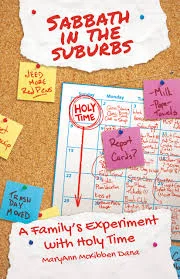What is an appropriate way to thank somebody for raising you – or someone you love – from the dead?
Well, if Lazarus, Mary, and Martha were anything like you or me, they had never been faced with this sort of question before, and were probably a little dumbfounded with the question of what to do for Jesus, who had just raised Lazarus from the dead.
Apparently, they decided that the best thing that they could do was to host an intimate dinner party for Jesus and one of his friends. And for those of us who have hosted a party before, we all know that one of the most difficult things to do is to narrow down the guest list. How many people should we invite? Where and at whom do we cut off the list?
Lazarus, Mary, and Martha obviously decided – whether for practical reasons or not – to keep the list small, and just invite Jesus and a friend. Now if Jesus had been married, or if he had a significant other, the friend part would have been easy. “Jesus, we’d like for you and your wife to join us for dinner.” But as far as we know, Jesus didn’t have a wife or a significant other, so perhaps they just simply said, “Jesus, we’d to have you over for dinner…bring a friend…maybe one of your disciples.”
And of all of Jesus’ friends and disciples to choose from, isn’t it odd that Jesus invited Judas. I wonder what Lazarus, Mary, and Martha thought, when they were expecting Jesus to show up with Peter or James or John, when he instead showed up with Judas Iscariot. But we all know that Jesus was drawn to the outsider. And of the twelve disciples, Judas was becoming just that – the one on the periphery. Perhaps Jesus invited him to give him the opportunity to be with three people who had seen, experienced, and been transformed by resurrection. Perhaps it was Judas who needed it the most.
Last week, we heard the parable of the Prodigal Son, where the deeper issue that the older son faced wasn’t his anger and resentment but his inability to recognize new life when he saw it. He came face-to-face with resurrection, and he missed it entirely. The father, on the other hand, had done the hard work of working through his anger and grief so that when resurrection finally entered into his midst, he was ready to embrace it.
So perhaps Jesus used this dinner party as an opportunity to expose Judas to light in the midst of darkness. Life out of death. A new creation.
I find it interesting that in our story today, two people remain completely silent – Lazarus and Martha. But the fact that we hear nothing from Lazarus or Martha tells me that this story isn’t supposed to be about them. It is about Mary and Judas, and how they respond to resurrection, and how they respond to God in their midst.
Mary responds with what Judas – and what many of us – would call wasteful extravagance. And I think that on one hand, Judas asks a fair question. The amount of perfume that Mary used to anoint Jesus’ feet would cost what would amount to about 10 months’ pay for a common worker or soldier. So we can’t immediately throw Judas under the bus for raising an eyebrow at such extravagance. One of the critiques of the Church today includes the hypocrisy of proclaiming how we care for the poor while we spend so much money on buildings, infrastructure, salaries, and pensions.
This reminds me of an annual parish meeting that we had at Epiphany Episcopal - the church I attended when I lived in Atlanta. After the presentation of the annual budget, the Rector opened up the floor for questions or comments. This situation provided me with one of the best learning moments I have ever had in church. A parishioner stood up and said, “When my wife and I are trying to decide which charitable organizations we should donate to each year, we make our decision based on the percentage of the donations that actually go to the mission of the organization itself versus the percentage that goes towards overhead and administration.” He had a number that he gave as the benchmark for what was a worthy organization to donate to – say, $.90 of every $1.00 must go directly to the mission itself. He then went on to say, “Based on this criteria for our charitable giving, we should NOT be giving to Epiphany. Only 10% of Epiphany’s annual budget goes towards outreach and mission. And look at all of this overhead –buildings, maintenance, salaries! This budget is an absolute disaster, and my wife and I are going to have to think really hard about whether or not we will continue to give to this church. Nobody who knows anything about charitable giving would see Epiphany’s budget and deem it a worthy cause to give to.”
I remember thinking to myself that this was a pretty good observation – like the one Judas had made about the perfume - and I was glad that the man had the courage to stand up and mention it to the rector in from of the whole congregation. I’ll also never forget the answer that the rector gave.
He said, “You are absolutely correct. If you are looking to donate money to a charitable organization, we are a horrible choice. And I’d recommend that you donate elsewhere. But the thing is – we are NOT a charitable organization. We are a church. We are the living body of Christ in the world – flawed, broken, yet committed to following Christ and allowing our encounters with Christ to transform us, so that we can then share the love of Christ with our neighbors. We baptize, confirm, educate, and nurture our children as they navigate childhood and adolescence towards young adulthood. If and when they find a life partner, we counsel them and invite them into the sacrament of marriage, covenanting to support and nurture them in their life together. We administer the sacraments – visible signs of God in our midst. We visit the sick, the elderly, and the lonely. When people die, we proclaim that death doesn’t have the last word as we celebrate their life and the resurrection. And hopefully we do many more things for a whole host of folks - both inside and outside our walls – throughout all the stages of their lives. But no, we are NOT a charitable, social service organization. And the minute that is all that the church becomes is the minute that I will quit being a priest.” I don’t know if that man who asked the question was satisfied, but I sure was.
I don’t think that the Prodigal Son’s older brother, or Judas, or that man at Epiphany were inherently bad people. I even think that they asked fair questions. Their flaws were that they were too busy counting. They were too busy keeping score. And while they were trying so hard to determine what was fair or prudent or even righteous, they failed to recognize God in their midst. After all, hadn’t that man at Epiphany just finished taking communion at the worship service prior to the annual meeting? Hadn’t he tasted the living God just minutes before? New life – resurrection - was staring him, the older brother, and Judas straight in the eyes, yet they saw right through it in their search for another sort of righteousness.
We have noted that this Lenten journey is among many things a journey of transformation. Our Lenten practices and disciplines shouldn’t be an end, but a means that stimulates growth and transformation. While the Prodigal son and his father were deeply transformed by their respective journeys, the older son remained stuck, and never experienced transformation. Mary went from being mad at Jesus for not healing Lazarus when he was sick to dropping to her knees and in an act of wasteful, extravagant love, anointing the feet of Jesus with a pound of expensive ointment. She experienced resurrection in her brother Lazarus. And she was able to see the source of that resurrection when it came in her midst. If she had had two, three, or four pounds of ointment, I have no doubt that she would have used it all on Jesus, because she wasn’t keeping count.
By embracing his wayward son, and by celebrating with an extravagant party, the prodigal’s father was inviting his older son to see, feel, and taste resurrection. By inviting Judas to accompany him at Mary, Martha, and Lazarus’ house, Jesus was inviting Judas to see, feel, taste, even smell resurrection. But Judas didn’t make room in his inner self to be transformed by this encounter. Like the older brother, he remained stuck. And if you’re like me, it is easy to get caught up in keeping score. It is easy to get stuck. Hopefully for us, as we draw nearer to the passion of our Lord Jesus Christ; as we draw nearer to Golgotha, and we draw nearer to the tomb, our Lenten journey will have prepared us so that when the stone is rolled away, we might see, feel, taste, and smell new life in our midst.










